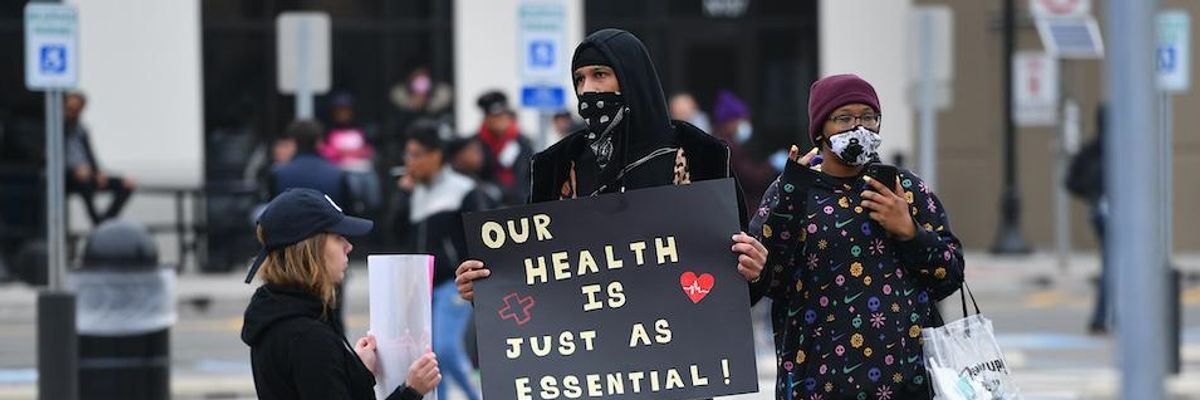Jay Carney, the former White House press secretary who now serves as Amazon's senior vice president of global corporate affairs, came under fire overnight for defending the retail behemoth's firing this week of a warehouse employee who had organized a worker protest demanding safer conditions amid the coronavirus outbreak.
In a tweet Wednesday night, Carney went after Sen. Bernie Sanders (I-Vt.), a candidate for the Democratic Party's 2020 presidential nomination, after the Vermont lawmaker defended Chris Smalls, a team manager at a fulfillment center in Staten Island who was terminated just a day after helping stage a walkout at the facility.
"That is absolutely immoral," Sanders said on Twitter Wednesday of Amazon's firing of worker Chris Smalls.
Carney, in response, claimed that Smalls was let go for violating social distancing rules put in place by Amazon for its workers and endangering the company's staff from the coronavirus, or COVID-19.
"Knowingly putting our team at risk is unacceptable," said Carney, who served in former President Barack Obama's White House as press secretary from 2011-2014.
But, as a number of observers pointed out, that reasoning rings hollow in the face of both the impetus for the strike--unsafe conditions, a lack of cleaning of the facilities, and little to no personal protective equipment (PPE) for employees--and an avalanche of reports indicating the company is putting profits over people as much as possible in its warehouses and distribution centers around the world.
"Why are you attacking your own workers for putting each other at risk of infection when your company is the one doing that?" asked economist Marshall Steinbaum.
One week ago, on March 26, HuffPostreported on the conditions in Amazon warehouses and the company's reluctance to take proactive measures to protect workers:
At least 10 Amazon warehouse workers have been diagnosed with COVID-19 as of Thursday, according to public reports. Employees say many more are likely sick. The company is not making cases public; news about cases have filtered out via warehouse workers. The company just shut down a Kentucky warehouse because of the outbreak, only after staffers protested because three workers tested positive for coronavirus.
The retail giant's safety record has been the subject of in-depth reporting over the past year, including:
- ProPublica and Buzzfeedrevealed Amazon ignored concerns over delivery drivers' safety, including fatal crashes, in favor of speed.
- The Guardianreported that the company let a man dying of a heart attack lie on the floor alone with no assistance for 20 minutes.
- Mother Jonesshowed in March how the company has become one of the most dangerous employers in the U.S., with little worker protections after injury.
- The Atlantic in December found that conditions had hardly improved, with workers reporting maiming and other physical issues fromt eh company's breakneck, "sweatshop" pace.
Amazon CEO Jeff Bezos is the richest man in the world, which observers noted in their tweets to Carney after his comments on Smalls' firing.
"Your boss is the richest person on Earth, and he just became $3.4 billion richer last month dumping stock in anticipation of this pandemic," said Claire Sandberg, national organizing director for the Sanders campaign. "How much does he pay you to pretend he can't afford to give his workers PPE and a sane paid sick leave policy?"
Smalls, in an open letter published at the Guardian Thursday to Bezos, wrote that it was clear his firing was related to the walkout. But, Smalls said, he remained undeterred in his efforts to help the company's workers ensure safe working conditions and promised there was more action to come.
"I believe they targeted me because the spotlight is on me," wrote Smalls. "The thing is, it won't work. I am getting calls from Amazon workers across the country and they all want to stage walk-outs, too. We are starting a revolution and people around the country support us."

